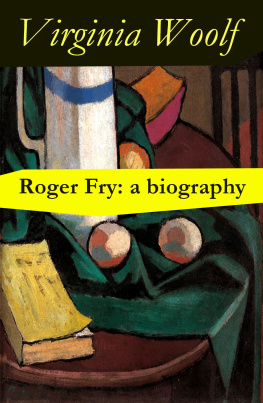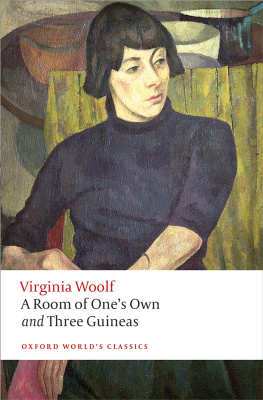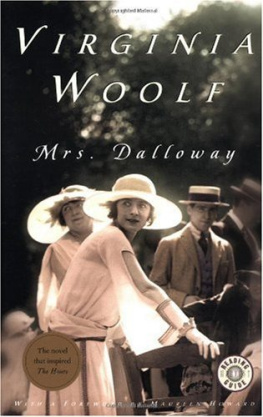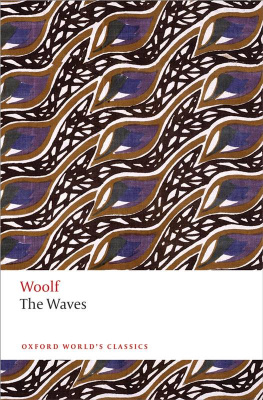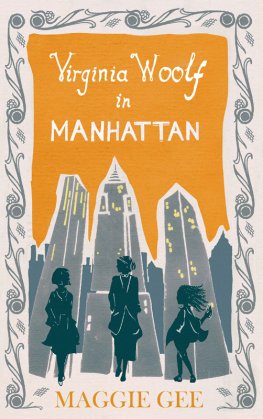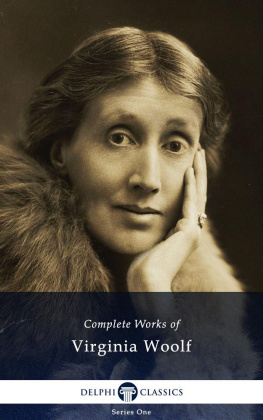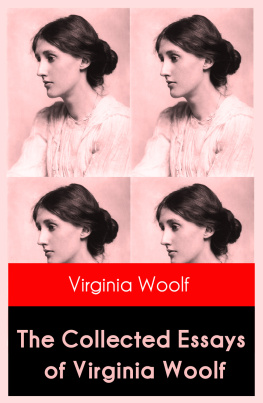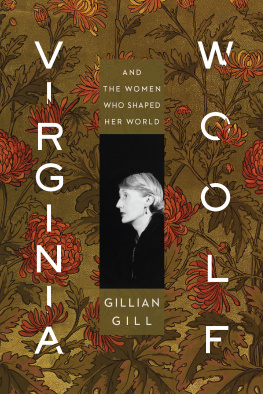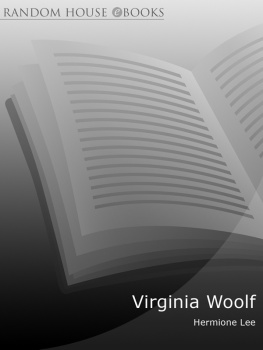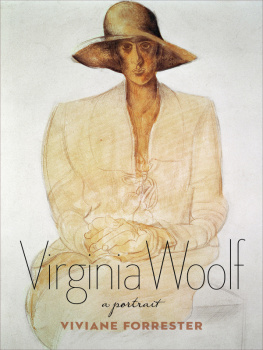ROGER FRY: a biography
published
1940
by The Hogarth Press
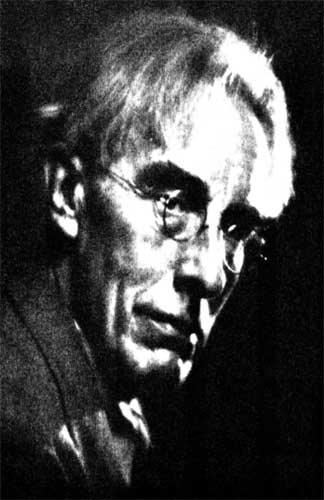
Roger Fry about 1928
Foreword.
London, April, 1940
Dear Virginia,
Years ago, after one of those discussions upon the methods of the arts which illuminated his long and happy friendship with you, Roger suggested, half seriously, that you should put into practice your theories of the biographers craft in a portrait of himself. When the time came for his life to be written some of us who were very close to him, thinking it would have been his wish as well as ours, asked you to undertake it.
I have now begged to have this page to tell you of our gratitude to you for having accepted, and for having brought to completion a piece of work neither light nor easy. As the book is to have no formal preface may I here join with yours our thanks to all those who have allowed the use of letters and pictures in their possession.
MARGERY FRY
Chapter I
Childhood: School
I
I lived the first six years of my life in the small eighteenth-century house at No. 6 The Grove, Highgate. This garden is still for me the imagined background for almost any garden scene that I read of in booksthus Roger Fry began a fragment of autobiography. We may pause for a moment on the threshold of that small house at Highgate to ask what we can learn about him before he became conscious both of the serpent which bent down from the fork of a peculiarly withered and soot begrimed old apple tree, and of the large red oriental poppies which by some blessed chance grew in his private and particular garden.
He was born on 14th December 1866, the second son of Edward Fry and of Mariabella, the daughter of Thomas Hodgkin. Both were Quakers. Behind Roger on his fathers side were eight recorded generations of Frys, beginning with that Zephaniah, the first to become a Quaker, in whose house in Wiltshire George Fox held a very blessed meeting, and quiet, though the officers had purposed to break it up, and were on their way in order thereunto. But before they got to it, word was brought them, that there was a house just broken up by thieves, and they were required to go back again with speed That was in 1663, and from that time onwards the Frys held the Quaker faith and observed certain marked peculiarities both of opinion and of dress, for which, in the early days, they endured considerable persecution. The first of them, Zephaniah, was in prison for three months for refusing to take the oath of allegiance. As time went on the persecution weakened; they had nothing worse to suffer than the sneers and coldness of their own class; but whatever they suffered they abode by their convictions consistently. The injunction Swear not at all meant that no oaths could be taken, and therefore many professions were shut to them. Some of the Frys added additional scruples of their own. Even the profession of medicine was distasteful to Joseph, the grandson of Zephaniah, because he could not feel easy to accept payment for the water contained in the medicines he dispensed. Such scruplesmiserable questions of dress and address, as Edward Fry came to call themtormented the weaker spirits and laid them open to ridicule. They vacillated between the two worlds. A coat-of-arms was first engraved and then scratched out; fine linen was ordered and then cut up; one John Eliot fretted himself into the conviction that he ought to outrage eighteenth-century convention by growing a beard. The arts as well as the professions were outside the pale. Not only was the theatre forbidden, but music and dancing; and though drawing and water-colour painting were tolerated or encouraged, the encouragement was tepid, for, with some notable exceptions, even in the nineteenth century almost the only picture to be found in a Quaker household was an engraving of Perms Treaty with the Indiansthat detestable picture, as Roger Fry called it later.
Undoubtedly the Quaker society, as one of its members writes, was very narrow in outlook and bounded in interests; very bourgeois as to its members. But the canalising of so much energy within such narrow limits bore remarkable fruit. The story of Joseph Fry is typical of the story of many of the Frys, Since, owing to his scruples, the medical profession was shut to him, he took to business occupations, and established, or took part in establishing, five considerable businesses which probably proved far more remunerative than the profession which he had renounced for conscience sake. Hence there came about a curious anomaly; the most unworldly of people were yet abundantly blessed with the worlds goods. The tradesman who lived over his shop in Bristol or in Bartholomew Close was at the same time a country gentleman owning many acres in Cornwall or in Wiltshire. But he was a country gentleman of a peculiar kind. He was a squire who refused to pay tithes; who refused to hunt or to shoot; who dressed differently from his neighbours, and, if he married, married a Quaker like himself. Thus the Frys and the Eliots, the Howards and the Hodgkins not only lived differently and spoke differently and dressed differently from other people, but these differences were enforced by innumerable inter-marriages. Any Quaker who married outside the society was disowned. For generation after generation therefore the sons of one Quaker family married the daughters of another. Mariabella Hodgkin, Roger Frys mother, came of precisely the same physical and spiritual stock as her husband Edward Fry. She was descended from the Eliots who, like the Frys, had been Quakers since the seventeenth century. They too had eschewed public life and had accumulated considerable wealth, first as merchants at Falmouth exporting pilchards and tin to Venice, and later in London, where they owned a large family mansion in Bartholomew Close. The Eliots married with the Howards, who were tinplate manufacturers and Quakers also. And it was through the marriage of Luke Howard, the son of Robert, the tinplate manufacturer of Old Street, with Mariabella Eliot that the only two names among all the names in the ample family chronicle in which their descendant Roger Fry showed any interest came into the family. His great-grandfather, Luke Howard (17721864), was a man of brilliant but rather erratic genius who, like so many of the Friends, being denied other outlet, turned his attention to science. He was the author of an essay proposing a classification and nomenclature of the clouds which attracted the attention of Goethe, who not only wrote a poem on the subject but entered into communication with the author. Mariabella Hodgkin could remember her grandfather. He seemed, she writes, always to be thinking of something very far away. He would stand for a long time at the window gazing at the sky with his dreamy placid look, and, like some of his descendants, he was deft in the use of tools and taught his grandchildren in his own workshop how to handle air pumps and electrical machines. Roger Fry left his copy of the family history uncut, but he admitted that he wished he knew more of this ingenious ancestor whose gift for setting other peoples minds to work by speculations which were not entirely confirmed by subsequent observation suggests some affinity of temperament as well as of blood. The other name that took Roger Frys fancy, though for different reasons, was his mothersMariabella. It was first given in the seventeenth century to the daughter of a Blake who married a Farnborough, whose daughter married a Briggins, whose daughter married an Eliot. It was a name with a certain mystery attached to it, for it was evidently Italian or Spanish in its origin, and Roger Fry, who took no interest whatever in the Eliots and their possible connection with the Eliots of Port St Germans, or in the Westons and their possible but improbable descent from Lord Weston, Earl of Portland, liked to think that his ancestress, the first Mariabella, owed her name to some connection with the South. He hoped that the quiet and respectable blood of his innumerable Quaker forefathers was dashed with some more fiery strain. But it was only a hope. No scandal in the Eliot family had been recorded for more than two hundred years. His mother, Mariabella Hodgkin, the seventh to bear that name, was a pure-bred Quaker like the rest; and it was in the Friends Meeting House at Lewes on a cloudless spring day in April 1859 that Edward Fry married her and brought her back to the small house in Highgate.

